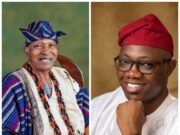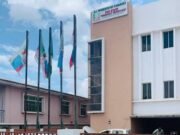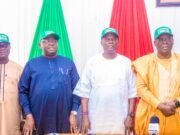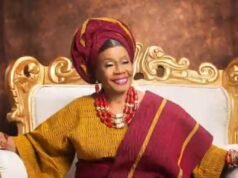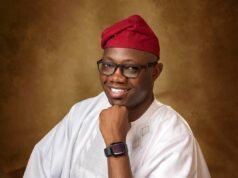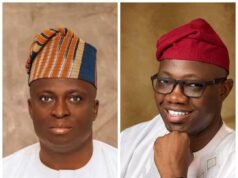The much awaited year of intensive and tough politicking has finally arrived. And with the recent verbal fisticuff between the opposition APC and ruling PDP over the performance and score card of the state Governor, Seyi Makinde, it has become crystal clear the kind of season we are. In other words, there will be more of this verbal exchange and confrontation between the two dominant parties in the state as we move closer to the next poll. As noted last week, this year will be rife and rock with drama and dilemma biggest of which will be how the two major political parties painstakingly deal with various internal bickering rocking them. Plus there will be shocks and surprises from all angles.
In a way, this year will present another golden chance for the political class to do what they love best: promise, project and profess although over-promising as the case in the past may likely backfire and open people’s eyes to reality plus the perils and pitfalls of unfulfilled promises made by politicians in recent poll. In addition, the hope of a better future has always been the centerpiece of politicians across the world. And Nigeria is not an exception. It is why politicians are some of the most optimistic people in the world. Where others see gloom and doom, politicians see boom and probably broom or umbrella! They see the light at the end of the tunnel and sometimes mix fiction and imagination with truth just to hoodwinked and manipulate people into dancing to their tune.
By historical account, this year is also likely going to share some semblance and similarity with the tough politicking year of 2010. No election year has recorded the continuous clashes of power brokers, godfathers, the kind of fight to finish and cut throat campaign that generated flurry of heated debates in the fourth republic as that year. In one epic, viral and contentious interview, late Aare Musulumi of Yorubaland, Alhaji Abdulazeez Arisekola Alao publicly disclosed his disaffection over the re-election bid of Governor Akala saying there is no way he would be allowed to break the second term jinx in the state. That interview send shockwaves across the state nooks and crannies deepening discord, disunity and division across different fault lines.
In essence, that interview confirmed the rumors flying round that the power that be are opposed to the second term bid of the Governor despite his overwhelming popularity among the people — and that the 2011 election is likely going to be the toughest and keenly contested poll in the history of the state. Unsurprisingly, the prediction and projection came to reality. 2011 poll remains by far the most hotly contested election in the state. The intense political horse-trading, politicking, name calling showed the extent to which the political class can go to bringing their ambitions and aspirations to fruition regardless of what happened. In other words, the event of that year was as novel as it was full of shocks and surprises. In that year, money flow freely same way various political tactics and strategies were deployed to win people’s hearts.
In a sense, the defeat of Otunba Adebayo Alao-Akala at the poll by late Senator Abiola Ajimobi also showed the limit of power. Despite his overwhelming popularity among the populace, state apparatus at his fingertips, reliance on federal mighty, and readiness to pump money into an endeavor, Governor Akala could still not stop his imminent defeat. What the event of that year implies is that the powerful may not be as powerful as they may want people to believe them to be. Which further showed that being the Governor doesn’t take away the fact that you can’t just step on toes or trample upon the coast of other power brokers. In an unlikely twist, the event of that year further reveals the paradox of elections, that sometimes it is not the people that really determine who wins election even when turn out is massively impressive.
Recall how curfew was declared across the state immediately the the Independent National Electoral Commission (INEC) declared Senator Abiola Ajimobi the winner of the election. In a way, the only set of people that saw the defeat of Governor Akala coming were those who opposed his rule and who planned meticulously to see his defeat by all means. Going forward, there are valuable lessons from the past the ruling PDP and opposition APC can glean only if they are ready to pick from the past to guide their moves in future undertakings.
Fortunately, most of the players of that year are still very much in the field of play now. To name just one example, Chairman, Governor’s Advisory Council (GAC), Senator Hosea Ayoola Agboola was a Commissioner under Otunba Akala and by dint of fate eventually became the only PDP Senator from the South West. One can assume that the fallout with Aare Musulumi at that time prompted the campaign team of Governor Seyi Makinde to reach out, lure and win the incumbent Aare Musulumi to their side. In the last election, there was ruckus among Muslim voters as to who to support and vote for. In part because religion has always play a subtle yet integral part in our politics and polity. Amid that confusion, the Makinde team swiftly reached out to the Aare Musulumi, Alhaji Dawud Akinola Makanjuola for endorsement and support. Though, overt, there is a body of proof to confirmed the harmonious working relationship between state officials and the religion leader.
For the opposition APC, the lesson will be about putting their house in order just to defeat the incumbent Governor and the ruling party. The event of 2010 showed that despite differences among the political gladiators, there was still a unanimous agreement in matters of party supremacy most importantly ahead of personal and individual interests. It was that cohesive, adaptive and creative approach to politics that gave the party an edge over the turn ruling party. In other words, the party hierarchy knew telling it as it is a way to go and anything short of that is going to blow their precious chances of winning the election. Unfortunately, Oyo APC has a long way to go in building a cohesive, adaptive and creative front ahead of next election.
As for the ruling PDP, the lesson from the past is simple: there is limit to what political power can do and that the earlier and faster and quicker the party leadership realize this, the better the chances of winning re-election. In other words, when the two parties tell it as it is, the people will be left to decide who deserve to be hired or fire as election draw closer.
OYO101, Muftau Gbadegesin’s opinion on issues affecting Oyo State, is published on Saturdays. He can be reached via muftaugbadegesin@gmail.com and 09065176850.
Of Tough Politicking | Muftau Gbadegesin
The much awaited year of intensive and tough politicking has finally arrived. And with the recent verbal fisticuff between the opposition APC and ruling PDP over the performance and score card of the state Governor, Seyi Makinde, it has become crystal clear the kind of season we are. In other words, there will be more of this verbal exchange and confrontation between the two dominant parties in the state as we move closer to the next poll. As noted last week, this year will be rife and rock with drama and dilemma biggest of which will be how the two major political parties painstakingly deal with various internal bickering rocking them. Plus there will be shocks and surprises from all angles.
In a way, this year will present another golden chance for the political class to do what they love best: promise, project and profess although over-promising as the case in the past may likely backfire and open people’s eyes to reality plus the perils and pitfalls of unfulfilled promises made by politicians in recent poll. In addition, the hope of a better future has always been the centerpiece of politicians across the world. And Nigeria is not an exception. It is why politicians are some of the most optimistic people in the world. Where others see gloom and doom, politicians see boom and probably broom or umbrella! They see the light at the end of the tunnel and sometimes mix fiction and imagination with truth just to hoodwinked and manipulate people into dancing to their tune.
By historical account, this year is also likely going to share some semblance and similarity with the tough politicking year of 2010. No election year has recorded the continuous clashes of power brokers, godfathers, the kind of fight to finish and cut throat campaign that generated flurry of heated debates in the fourth republic as that year. In one epic, viral and contentious interview, late Aare Musulumi of Yorubaland, Alhaji Abdulazeez Arisekola Alao publicly disclosed his disaffection over the re-election bid of Governor Akala saying there is no way he would be allowed to break the second term jinx in the state. That interview send shockwaves across the state nooks and crannies deepening discord, disunity and division across different fault lines.
In essence, that interview confirmed the rumors flying round that the power that be are opposed to the second term bid of the Governor despite his overwhelming popularity among the people — and that the 2011 election is likely going to be the toughest and keenly contested poll in the history of the state. Unsurprisingly, the prediction and projection came to reality. 2011 poll remains by far the most hotly contested election in the state. The intense political horse-trading, politicking, name calling showed the extent to which the political class can go to bringing their ambitions and aspirations to fruition regardless of what happened. In other words, the event of that year was as novel as it was full of shocks and surprises. In that year, money flow freely same way various political tactics and strategies were deployed to win people’s hearts.
In a sense, the defeat of Otunba Adebayo Alao-Akala at the poll by late Senator Abiola Ajimobi also showed the limit of power. Despite his overwhelming popularity among the populace, state apparatus at his fingertips, reliance on federal mighty, and readiness to pump money into an endeavor, Governor Akala could still not stop his imminent defeat. What the event of that year implies is that the powerful may not be as powerful as they may want people to believe them to be. Which further showed that being the Governor doesn’t take away the fact that you can’t just step on toes or trample upon the coast of other power brokers. In an unlikely twist, the event of that year further reveals the paradox of elections, that sometimes it is not the people that really determine who wins election even when turn out is massively impressive.
Recall how curfew was declared across the state immediately the the Independent National Electoral Commission (INEC) declared Senator Abiola Ajimobi the winner of the election. In a way, the only set of people that saw the defeat of Governor Akala coming were those who opposed his rule and who planned meticulously to see his defeat by all means. Going forward, there are valuable lessons from the past the ruling PDP and opposition APC can glean only if they are ready to pick from the past to guide their moves in future undertakings.
Fortunately, most of the players of that year are still very much in the field of play now. To name just one example, Chairman, Governor’s Advisory Council (GAC), Senator Hosea Ayoola Agboola was a Commissioner under Otunba Akala and by dint of fate eventually became the only PDP Senator from the South West. One can assume that the fallout with Aare Musulumi at that time prompted the campaign team of Governor Seyi Makinde to reach out, lure and win the incumbent Aare Musulumi to their side. In the last election, there was ruckus among Muslim voters as to who to support and vote for. In part because religion has always play a subtle yet integral part in our politics and polity. Amid that confusion, the Makinde team swiftly reached out to the Aare Musulumi, Alhaji Dawud Akinola Makanjuola for endorsement and support. Though, overt, there is a body of proof to confirmed the harmonious working relationship between state officials and the religion leader.
For the opposition APC, the lesson will be about putting their house in order just to defeat the incumbent Governor and the ruling party. The event of 2010 showed that despite differences among the political gladiators, there was still a unanimous agreement in matters of party supremacy most importantly ahead of personal and individual interests. It was that cohesive, adaptive and creative approach to politics that gave the party an edge over the turn ruling party. In other words, the party hierarchy knew telling it as it is a way to go and anything short of that is going to blow their precious chances of winning the election. Unfortunately, Oyo APC has a long way to go in building a cohesive, adaptive and creative front ahead of next election.
As for the ruling PDP, the lesson from the past is simple: there is limit to what political power can do and that the earlier and faster and quicker the party leadership realize this, the better the chances of winning re-election. In other words, when the two parties tell it as it is, the people will be left to decide who deserve to be hired or fire as election draw closer.
OYO101, Muftau Gbadegesin’s opinion on issues affecting Oyo State, is published on Saturdays. He can be reached via muftaugbadegesin@gmail.com and 09065176850.



